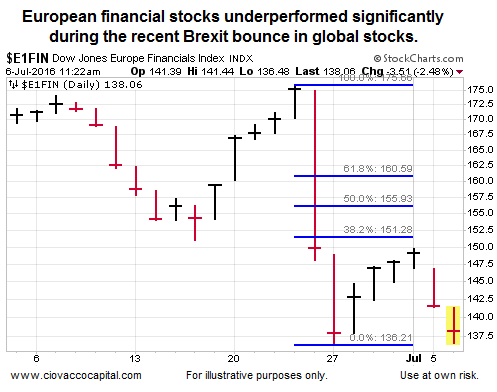Bad Loans in Italy a Big Problem
The UK’s recent vote to leave the EU has shed some additional light on existing weak spots in the European economy. One of those weak spots is Italian banks. From The Wall Street Journal:
Britain’s vote to leave the EU has produced dire predictions for the UK economy. The damage to the rest of Europe could be more immediate and potentially more serious. Nowhere is the risk concentrated more heavily than in the Italian banking sector. In Italy, 17% of banks’ loans are sour. That is nearly 10 times the level in the US, where, even at the worst of the 2008-09 financial crisis, it was only 5%. Among publicly traded banks in the eurozone, Italian lenders account for nearly half of total bad loans.
Some Calling for More Bailouts
The EU has formal dos and don’ts when it comes to assisting financial institutions. A dialog is taking place about those rules. From Bloomberg:
Italy’s banking crisis could spread to the rest of Europe, and rules limiting state aid to lenders should be reconsidered to prevent greater upheaval, Societe Generale SA Chairman Lorenzo Bini Smaghi said. “The whole banking market is under pressure,” the former European Central Bank executive board member said in an interview with Bloomberg Television on Wednesday. “We adopted rules on public money; these rules must be assessed in a market that has a potential crisis to decide whether some suspension needs to be applied.”
See Europe's Unresolved Banking Crisis Continues
The term “backstop” is the politically correct way of saying bailout, something that may not be welcomed by taxpayers, especially given the current tone of the electorate. From Bloomberg:
Bini Smaghi said on Bloomberg TV that Europe’s banking market faces the risk of a systemic crisis unless governments accept the idea of taxpayer money as the ultimate recourse. Any intervention should be as swift as possible, he said. Both Italy and Germany have too many banks that are not profitable and more consolidation is needed, he said. Italy must do more to deal with non-performing loans, and Prime Minister Matteo Renzi will have to take politically unpopular steps, including encouraging mergers that will lead to job cuts, Bini Smaghi said. “What’s needed is a European solution,” he said. “So far, we’ve had national solutions. We need a clear backstop.”
Brexit Brings More Uncertainty
The fact that Italian banks are carrying an alarming amount of non-performing loans on their books is not particularly new. However, Brexit exacerbates concerns related to future economic outcomes. From CNBC:
“The UK’s Brexit referendum has injected greater uncertainty into European growth forecasts, including Italy’s. That in turn has created worries about higher loan losses at the country’s banks, coupled with falling government bond yields that further hurt financial institutions’ margins. taly’s banking system is considered to be one of the most vulnerable in the euro zone with a high level of non-performing loans (NPLs) — estimated to total 360 billion euros (0.7 billion) — overshadowing the sector.
Fears of Brexit Contagion
Discussions concerning the possibility of “backstopping” Italian banks could lead to increasing questions about the benefits of staying in the EU. From CNN:
An Italian banking crisis, together with the Brexit vote, could inflame anti-European sentiment. Italians are already losing faith in the euro, and the clamor for a referendum on the currency is getting louder. Prime Minister Matteo Renzi is at risk of losing a vote this fall on constitutional reform. If he does, he may be forced to resign, leading to new elections at a time when Italy’s anti-euro party, the Five Star Movement, is gaining ground. “The traditionally very pro-European country has become more euro-sceptic after years of economic stagnation and painful fiscal repair,” wrote Holger Schmieding at Berenberg bank. “The risk of domino effects across the eurozone looms larger than before.”
During a recent visit to EU Parliament, George Soros expressed concerns about Europe’s entire banking system, which is one of the reasons asset class behavior had a decidedly defensive bias during last week’s rally in risk assets.









